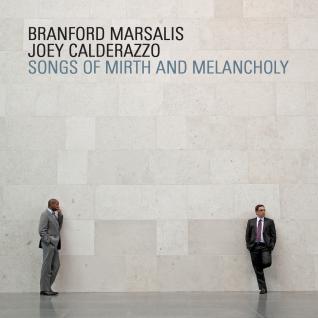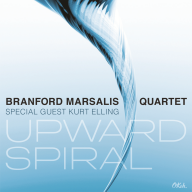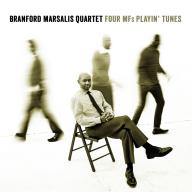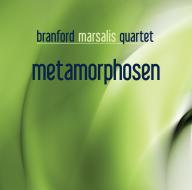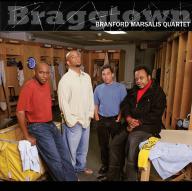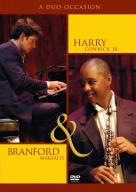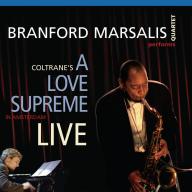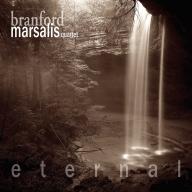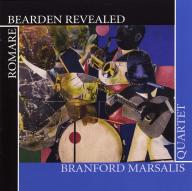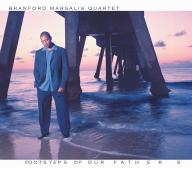Few contemporary pairings of saxophonist and pianist have been as inspired and productive as that of Branford Marsalis and Joey Calderazzo. Since replacing the late Kenny Kirkland in Marsalis’ quartet in 1998, Calderazzo has blended seamlessly into the uncompromising creative atmosphere of the ensemble and revealed new facets of his own conception, while Marsalis in turn has been inspired by the pianist’s challenging instrumental support and growing strength as a composer. The relationship grows ever deeper, as documented on the new Marsalis Music CD Songs of Mirth and Melancholy.
Adding duo performances to their quartet collaboration is an idea launched on the golf course – or, more precisely, the 19th hole. As Calderazzo explains it, “The duo originated when Branford and I would play a couple of numbers at celebrity golf tournaments. But we really took it to another level at the 2009 Newport Jazz Festival, where we played four tunes in a short set and the interaction was really happening. That’s when we decided to record.”
The session was a logical step for Marsalis, who has previously displayed his duo prowess in albums with his father Ellis (Loved Ones, Columbia, 1995) and Harry Connick, Jr. (Occasion, Volume 2 of Marsalis Music’s “Connick on Piano” series, 2005, and the complementary Marsalis Music DVD A Duo Occasion, filmed at the 2005 Ottawa Jazz Festival). “I have only played duo with Harry, my dad and Joey,” the saxophonist says, “and with Joey I can go in different directions.”
As in his previous duo encounters, the goal for Marsalis is musicality rather than technicality. “Playing duos is not a ‘you know the chords, I know the chords, let’s go’ situation,” he emphasizes. “It’s not just starting and stopping at the same time. I need a constant level of engagement from everyone when I play, and the drums in a jazz group can change the equation, in the sense that it can cover up people in a band who are just playing their parts. The duo is more like classical chamber music. You have to listen to each other or it doesn’t work.”
Calderazzo concurs. “I like the idea of improvising together, instead of ‘backing’ a soloist. If you trust what I’m trying to do, the music we make together will be far more interesting than what you could do on your own, and my partners have that same freedom to make what I do sound better. I can throw anything at Branford, and his ears are so good that he’ll always figure out something to play. And the variety of ways that he can play makes the duo really interesting.”
Marsalis has similar enthusiasm for the pianist, whose growth he has witnessed first hand. “From the time I met Joey, when he was 14, I knew that he had a passion for music, and I always wondered how he would sound if he had more of the tradition under his belt. With our band you have to know the tradition, so he started checking things out; but it was more he than I. As my dad says, you can lead a horse to water, but you can’t make him thirsty. Joey was parched – not because he rejected other styles so much as never having been exposed to them – and he is not the kind of dude who backs away from challenges.”
“Branford has forced me to step it up,” the pianist concurs. “My ability to make music is far better than it was when I joined the band. I put myself out there now, painting myself into corners to see if I can figure out the puzzle. That’s the great thing about getting older. I don’t care about what the audience might think if I screw up, I just care about being the best musician I can be.”
These attitudes fuel the nine performances that comprise Songs of Mirth and Melancholy. “We’ve all heard duo records that are just Music Minus Two, where guys don’t take advantage of the format and just play the same choruses on the same tunes. They pretend that the bass player and the drummer are still there; but the object is not to play in the same way that you play in other situations. You have to change the conversation as well as the setting. Once you know the form, you can just react to each other, which you can’t do when a group gets larger.”
“The first things I rule out in duo playing are walking bass lines and ostinatos,” Calderazzo adds. “The idea is to capture a spirit, a vibe, to improvise completely instead of just playing things that you know you can play.”
One key for both musicians is to absorb a wide variety of influences without feeling shackled by them. “I can play a little like a lot of guys, and a little of it all comes through,” Calderazzo admits. “But I could spend a lifetime trying to play like Herbie [Hancock] or McCoy [Tyner] and never do it. In recent years I feel that I’m finally developing my own stuff, and since I can’t tell you what my direction is, maybe it really is my stuff.” As Marsalis sees it, “We are all products of our environment, but I’ve always felt that I could improve by borrowing from other people’s environments. So when I listen to one of my new pieces, ‘The Bard Lachrymose,’ I can hear things that I lifted from Prokofiev and Schumann. I’m not trying to write things that are intentionally hard; but because I’m drawing on so much that I’ve heard, what results cannot be approached with the familiar methodology.”
The nine tracks on Songs of Mirth and Melancholy show the diverse results that can flow from these shared concepts. In addition to “The Bard Lachrymose,” which reflects lessons learned from Ornette Coleman and Keith Jarrett about liberating melodies from rigid bar-line constructions, Marsalis contributed two other new compositions, “Precious” (“I went home and wrote that one right after seeing the movie”) and “Endymion.” There are two new Calderazzo compositions, the jaunty opener “One Way,” which nods in form and title to Ron Carter’s “Round Trip,” and the tender “La Valse Kendall,” plus new versions of Calderazzo’s “Hope” (first heard on the Branford Marsalis Quartet disc Braggtown) and “Bri’s Dance” (which both opened and closed Calderazzo’s solo CD Haiku). The duo also covers Wayne Shorter’s “Face on the Barroom Floor,” a longtime Marsalis favorite from the Weather Report album Sportin’ Life, and the Brahms song “Die Trauernde,” which Marsalis identifies as “the inspiration for how we approach everything as a duo.”
As usual, the program allows Marsalis to display his multi-instrumental chops. He is heard on tenor saxophone on “One Way,” “Endymion” and “Precious,” and soprano saxophone on the remaining numbers. “When I hear a song in my head, I can tell within the first couple of bars which horn will be the right horn,” he says.
Marsalis also has no doubts about where to record. Like his previous three Marsalis Music discs and the two by Calderazzo that Marsalis produced for the label, Songs of Mirth and Melancholy was taped in Durham, North Carolina’s Hayti Center. “I love recording in the South because of the pace,” Marsalis explains, “and I love Hayti because it’s not really a studio, so you don’t deal with the usual studio hang-ups. There is a special property in the room, achieved by accident that studios and concert halls pay millions to achieve. The sound is incredibly intimate, and very naked.”
The same could be said of the sounds that Branford Marsalis and Joey Calderazzo have brought forth in this passionate and profound duo collection.
Please visit our YouTube channel to watch the video “Inspirations and Methods;” part 1 in a series of videos that focus on the making of the duo’s debut album.
